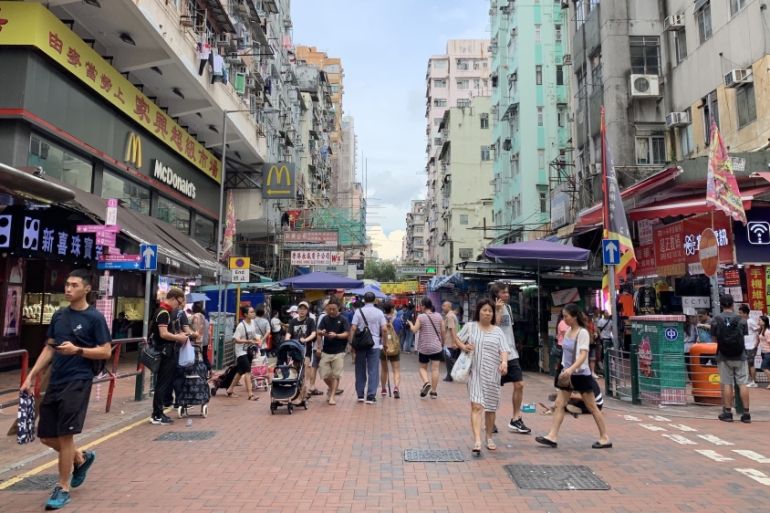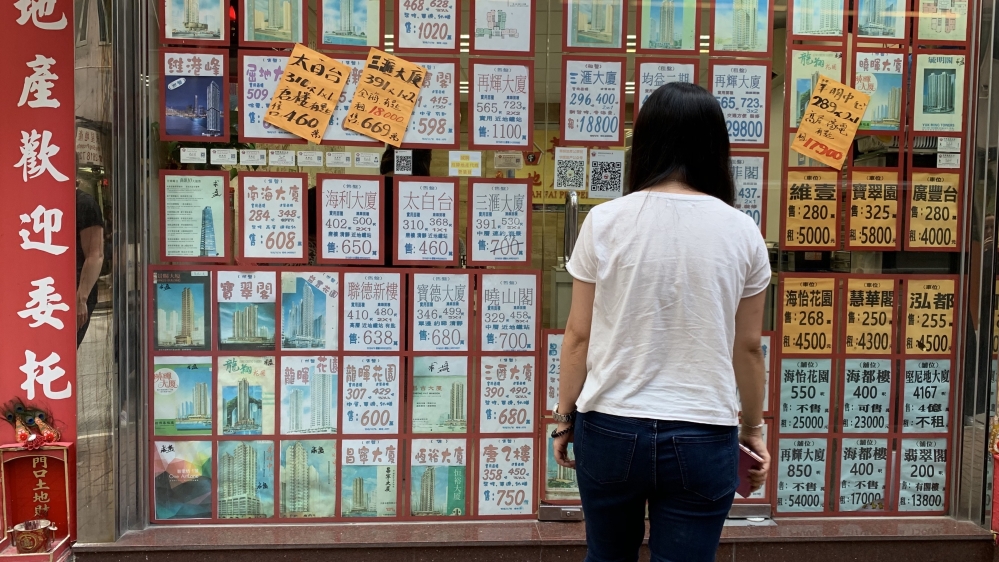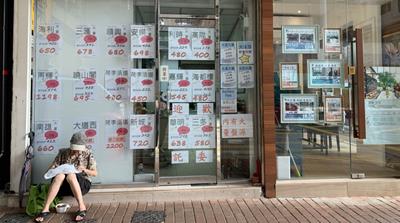A lack of affordable housing feeds Hong Kong’s discontent
Frustration at the Chinese territory’s sky-high property prices is one of many reasons why people are protesting.

Hong Kong – Oliver Liu, 35, describes how, in the late 1970s, his father read an advertisement in a local newspaper for a new round of public housing flats going up for sale in Hong Kong.
Thirty years on, now working as a journalist, Liu still sleeps in one of those flats in his childhood bunk bed, which he once shared with his sister growing up. “The room was cramped [even] when I was little, especially during homework time because we shared a desk”, he says.
Keep reading
list of 4 itemsRussia’s Putin eyes greater support from China for Ukraine war effort
India-Iran port deal: A gateway to Central Asia or a geostrategic headache?
India’s income inequality widens, should wealth be redistributed?
His sister has since moved out of the family home, a 35-square-metre public housing unit in Hong Kong’s New Territories.
On the other side of Hong Kong’s housing divide is Julia Chan, an executive assistant at one of the city’s public hospitals.
The 26-year-old also lives with her parents, although her privately owned family home is almost five times the size of Liu’s flat.
“We have three bedrooms, a spacious living room, and a big kitchen. It’s definitely a very large flat by Hong Kong standards,” says Chan.
Though from different circumstances, Liu and Chan share a problem faced by most of the city’s population: buying a property is a distant dream.
In a global survey released in January by United States research firm Demographia, Hong Kong retained its title as the world’s least affordable housing market for a ninth consecutive year. That means the average price for a home is a staggering 20.9 times the annual household income in Hong Kong.
Vancouver ranked a distant second place in the survey. There, it would take an average of 12.6 years to save enough money to buy a home. For those on a median salary in New York, getting on the property ladder takes an average of 5.5 years.
It’s little wonder, then, that just 49.2 percent of the population in Hong Kong own property in the territory, according to government figures. By comparison, 91 percent of people in Singapore are homeowners.
Housing headache
Liu says he feels stuck.
“I’m not eligible for public housing. I’m in the so-called sandwich class: my income is too high for housing, [and] too low to pay for a down payment to buy a place. At the same time, it would be hard for me to rent a flat with the market price as it is,” he says.
Even if Liu was eligible, the average wait for public housing in Hong Kong is longer than it has ever been: five and a half years.
Chan is one of the lucky ones, “In theory, I could purchase a property if my parents lent or gave me the money for it,” she says. “In Cantonese, people call it ‘Success by your father’s hard work’. It’s a play on a popular saying about being successful through your own hard work.”

Earlier this year, Chan submitted an application for the Home Ownership Scheme (HOS), a government initiative to help young people buy their first flats.
Based on data collected by the Hong Kong Housing Authority, the chance of being successful in last year’s batch of applicants was a mere 1.63 percent.
“My chances are so slim,” says Chan. “Getting drawn for the HOS has been compared to winning the lottery. You are purchasing a hope in applying.”
According to the government, the city’s topography – much of Hong Kong is hilly – and an acute shortage of land are to blame.

But critics cite a lack of policies aimed at boosting land supply and a reluctance to curb speculation.
Brian Wong is a member of the Liber Research Community, a local nongovernmental organisation focused on land and development.
“The housing problem in Hong Kong has become a humanitarian crisis, in which the government’s policy interventions have been feeble,” Wong tells Al Jazeera. “The root cause is unjust land allocation, not insufficient land supply.”
Blurred vision
While Hong Kong Chief Executive Carrie Lam has been credited for being more proactive than her predecessors on housing, an ambitious plan to build 1,700 hectares of artificial islands between Lantau Island and the main Hong Kong Island has courted fierce criticism.
In particular, opponents to the Lantau Tomorrow Vision have slammed the $63.8bn price tag, which is equivalent to around half of Hong Kong’s fiscal reserves. The government says the project could accommodate up to 1.1 million people, with the first batch of units available by 2032.
The Liber Research Community calls for a more immediate solution. It says the government should instead be developing the more than 1,500 hectares of underutilised land in rural areas, such as parking lots and container yards. Ninety percent of these spaces, known as brownfields, could be developed into apartment blocks.
“It is clearly understood among the public that the primary objectives for the Lantau project are not to solve the land supply issue, but that it could be related to an initiative to further integrate the city with mainland China,” says Wong.
“It’s a highly politically sensitive subject.”

In light of recent mass protests surrounding a controversial proposal by the Hong Kong government to extradite suspects to mainland China, the territory’s lawmakers on both sides of the spectrum are now pressing Lam to delay her Lantau Tomorrow Vision.
In their view, the city is already a hotbed of discontent, and Lam should be careful not to stoke tension further.
“It is like using a sledgehammer to crack open a nut,” says Wong.
“The Lantau project is not based on sound justification and rational policy planning,” he says. “Carrie Lam will for sure face opposition when putting forward such an absurd proposal, no matter what the social climate is in Hong Kong.”
Tammy Chu from Concerning Grassroots Housing Alliance says frustration at housing policies is already boiling over.
“Our organisation and others have launched several protests in order to fight for our housing rights,” she says. “The housing crisis will add to frustration and get more people out onto the streets.”
A recent survey paints a grim picture of the impact that Hong Kong’s red-hot property market is having on society.
Two-thirds of respondents say they expect property prices to continue to rise in the next six months, while the average age at which respondents expect to be able to buy a property is now 44. Sixty percent of people who showed an interest in co-living spaces were married, while some residents are shifting into micro spaces and even sleeping in McDonald’s restaurants.
Others, like Olivier Liu, are ready to pack up and leave.
“I’ve been planning to move to Chiang Mai in Thailand because the living expenses are way lower than in Hong Kong. Even if I earned a third of what I do now, at least I would be able to save.”
This article is part of AJ Impact’s ongoing series about housing and its many complex business, technological and political dimensions. A global demographic shift is taking place as enormous numbers of people migrate to urban centres looking for places to live and work. Click here to read past articles about housing in Berlin, Tehran, New York City, Lagos, Nigeria or Chicago in the US.